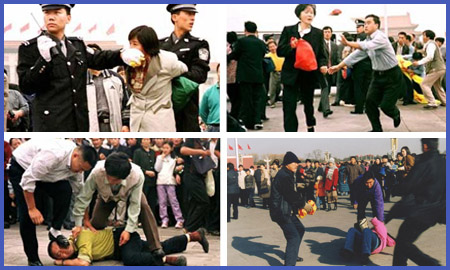
Falun Gong practitioners protested in Tiananmen Square
Blood Testing of Detained Falun Gong Practitioners
Some Chinese prisons have a regulation to provide “periodic physical exams” for inmates. In reality that is hard to carry out. However, the health checklist for Falun Gong inmates is different from the one used for regular inmates. According to a 2004 Xinhuanet website report on the Shanghai Tilanqiao Prison, common physical exam items for regular inmates included “taking blood pressure, listening to the heart and lungs, palpating the liver and spleen area, and taking chest X-rays,” which would cost roughly 60 yuan. [1] Blood tests are not done routinely on regular inmates. For detained practitioners, on the other hand, blood tests, which are a key step in organ matching, were very common.
In July 2009, during the taping of “Between Life and Death,” New Tang Dynasty Television (NTDTV) interviewed several practitioners who had undergone such blood tests during their detention.
Ms. Gan Na, who currently lives in Toronto, Canada, was from Beijing. She was a former customs official at the Beijing Airport. In 2001, when she was detained for the third time at the Xin’an Women’s Forced Labor Camp, she was given a blood test, X-rays, an electrocardiograph test, and eye exams. She told NTDTV, “It seemed very strange to me at the time. The guards at the forced labor camp had never treated us like we were human, yet we were given this thorough physical exam. It felt very strange.”
While practitioners in labor camps are possible victims of organ harvesting, those missing could face a more horrible fate.
Many Falun Gong Practitioners Who Refused to Reveal Their Names and Addresses Went Missing
A phenomenon worth mentioning here is that the regime has adopted a vicious implication policy in its persecution of Falun Gong practitioners. Members of a practitioner’s family can be fired from their jobs; supervisors at the person’s workplace can be punished; co-workers can lose their bonuses; in some cases, even local government officials can lose their positions. Through this policy, the regime solates Falun Gong practitioners and turns everyone against them. As a result, others are more willing to participate in the persecution. Those who previously sympathized with Falun Gong become resentful when they lose their bonuses, and local government officials do everything they can to prevent Falun Gong practitioners from going to Beijing to appeal so they can save their positions. Local public security members have been dispatched to Beijing to stop local practitioners from appealing to the Central Office of Letters and Calls; the Beijing Office of the local government has turned into a police station to arrest and detain Falun Gong practitioners who have gone to Beijing.
To resisting the regime’s implicating policy, many practitioners who went to appeal refused to reveal their names and addresses to the authorities. Based on practitioners’ sharing articles on the Minghui website, resisting the demands to reveal identity and location became a common practice after 2000. What has happened to these practitioners? Many of them went missing and likely were detained in large concentration camps. In hindsight, the detention of these practitioners in large numbers would have helped facilitate large scale live organ harvesting.
In their book, Bloody Harvest, The killing of the Falun Gong for their organs, authors David Matas and David Kilgour interviewed many Falun Gong practitioners around the world who had been detained in China. These practitioners all mentioned that they had met many practitioners in detention centers who refused to reveal their names and addresses, and they eventually went missing. At the same time, many of the missing practitioners’ families did not know that these practitioners had gone to appeal for Falun Gong and therefore had no idea of their whereabouts. The harsh reality is they do not know where to find their loved ones.
Guo Guoting, a Chinese lawyer living overseas, confirmed that one of his clients, Huang Xiong, whom he represented while he was in Shanghai, was in a similar situation. Huang Xiong went missing from his dorm in Shanghai Jiao Tong University, and his whereabouts remain unknown.
In “New Leads in the Investigation of the Sujiatun Concentration Camp,” a practitioner stated, “After December 20, 2000, the number of practitioners sent to detention centers suddenly increased to dozens or even over a hundred each day, whereas previously only about one dozen practitioners would be sent there… All practitioners were assigned a number… Within a few days the cells were full. The guards interrogated them each day and asked for their names. They used electric batons and other forms of torture on the practitioners and also encouraged the inmates to beat the practitioners. Most of the practitioners still refused to tell their names. The guards finally stopped asking and said, ‘Ok, if you refuse to tell me, I’ll send you to a place where you will tell.’
“In early 2001, groups of practitioners were sent away in big buses in the early morning every other day. An 18-year-old girl from Shandong Province shared the same cell with me. Her number was K28. One morning her number was called by mistake. She got on the bus but later returned. She said all of the practitioners were being taken to northeastern China. Later, the guards openly told us that they were sending the practitioners to northeastern China. During that period, many of them were sent there from Beijing.” [2]
Existence of “Concentration Camps”
An insider who worked in a mainland Procuratorate once told us that no forced labor camp or prison in China would detain an inmate who did not have a name or address for long because they could not complete the registration process. These inmates would be transferred to other locations. Then what happened to those missing Falun Gong practitioners? In March 2006, a whistleblower alerted the world to the possibility of live organ harvesting from Falun Gong practitioners at the Sujiatun Detention Center in Shenyang City, Liaoning Province. Thus, a potential new source of organs was identified.
[1] Xinhua Net, “Hearing of Commutation Cases Is a Beneficial Exploration”, http://news.xinhuanet.com/comments/2004-06/10/content_1518473.htm
[2]Clearwisdom.net, “New Leads in the Investigation of the Sujiatun Concentration Camp,” http://www.clearwisdom.net/emh/articles/2006/3/22/71075.html
